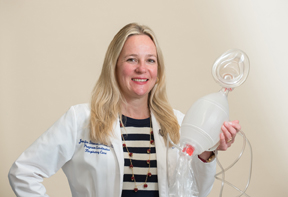A Career in Breathing

Jennifer Jackson-Stevens is a registered respiratory therapist who is the coordinator of the NECC respiratory care program.
Jennifer Jackson-Stevens likes to tell her respiratory care students they make a difference in the world one breath at a time.
“For me there is nothing more rewarding than teaching others how to save lives,” she says. ”Other than the pulmonologist and the anesthesiologist, no other member of a patient’s healthcare team knows more about the respiratory system and the respiratory life-saving techniques than the respiratory therapist.”
As program director of Northern Essex’s respiratory care associate degree program, Jackson-Stevens emphasizes the importance of their role as a specialized healthcare practitioner in a hospital setting.
A registered respiratory therapist for 24 years, she stays current in the field by continuing to work in the hospital setting. A second-generation therapist, she followed the path of her father, who continues to work as a respiratory therapist.
“It was nice to see that my father always had a secure job and that he always came home in a good mood because of his rewarding profession,” she said.
Jackson-Stevens is herself a graduate of a community college respiratory care program, and as such, understands and appreciates the challenges as well as the benefits of earning an associate degree in respiratory care from Northern Essex. After just two semesters in the program, respiratory care students can work in the hospital as a “student respiratory therapist” where they can earn approximately $20 an hour, gain experience, and build contacts, she says.
Training and educating the next generation of students is fulfilling to Jackson-Stevens. She has taught at NECC for 15 years – five as a clinical instructor and 10 as a full-time classroom instructor.
While Jackson-Stevens teaches a number of health classes within the program, she particularly enjoys teaching Respiratory Modalities IV one of the final course requirements.
“It allows me to share with the students all of our wonderful state-of-the-art equipment in our world class simulation center. It provides the students a very realistic, hands-on, learning experience,” she says.
Experience they will appreciate once they are in a hospital setting, she says. That is good news, since the job outlook is promising for two-year graduates.
According to the U.S. Board of Labor & Statistics, the respiratory care field is expected to grow 23 percent between now and 2026 – that is faster than the average job growth. According to Indeed.com, the average salary for respiratory therapists in Boston is $36.30 an hour, which is 12 percent above the national average.
In addition to her associate degree from Massasoit Community College, she holds a Bachelor of Arts in Biology and Master of Education from Eastern Nazarene College.
She is proud of the fact that NECC’s respiratory care program just received the Distinguished Registered Respiratory Therapist Credentialing Success from the Commission on Accreditation for Respiratory Care.
“This award recognizes the program’s success in inspiring its graduates to achieve their highest educational and professional aspirations,” she says.
That could be why her favorite quote is “respiratory therapists: real life heroes”.
For more information on the program, contact Jackson-Stevens at jjacksonstevens@necc.mass.edu






